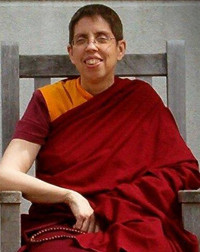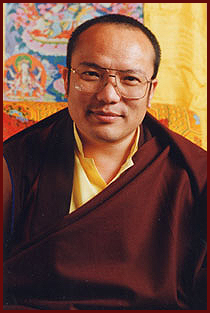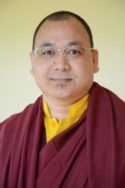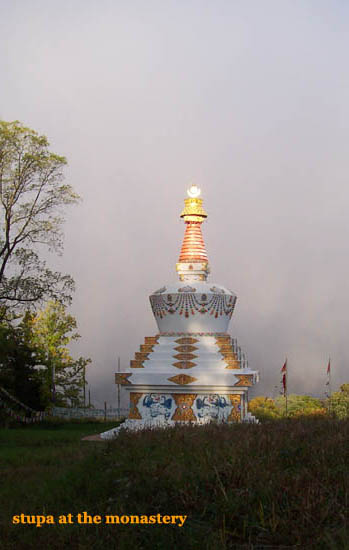Jump down the page to… Our Spiritual Lineage & affiliations | PST Organization & membership
our Purpose
Palpung Shenpen Tharchin (PST) was founded in 1993 to support the practice and study of Vajrayana Buddhism, as transmitted through the Karma Kagyu and Shangpa Kagyu lineages of Tibet.
We meditate, pray, and study to deepen our innate wisdom and compassion. We vow to accomplish completely the enlightenment of each and every sentient being.

We help each other along the path by weekly meetings, occasional retreats, visits from teachers, and by encouraging each other in individual meditation. Those who have been around longer share their experience and knowledge; those who are new open our eyes with fresh insights.
Our first meeting was on January 19, 1993. We have met nearly every week since then, rain or shine. We get together now and then for special practices, such as seminars, retreats, and fire pujas, complete with potluck meals. We have been honored to host in Richmond and Charlottesville such great masters of the Kagyu lineage as Khenpo Tsultrim Rinpoche and the Kenting Tai Situpa Rinpoche.
Everyone who attends our events and meetings is expected to adhere to PST’s ethics policy – here.
The Dharma nectar of wisdom and compassion falls on all beings alike. We are inclusive.
our spiritual Lineage & affiliations
As a Tibetan Buddhist practice and study group, our lineage is Karma Kagyu, as directed by the Karmapa, Ogyen Trinley Dorje. We’re affiliated with Palpung Congregation, Palpung Thubten Chöling monastery, and Ekoji Buddhist Sangha of Richmond.

In 2021, we became affiliated with the Palpung Congregation of the Tai Situpa Rinpoche, and changed our name from Kagyu Shenpen Tharchin to Palpung Shenpen Tharchin. Pal means “glorious,” pung means “to gather.” Palpung means “glorious gathering of study and practice.” The rest of our name, Shenpen Tharchin, means “the complete accomplishment of benefiting others.”
Palpung Congregation was founded as a monastery by the 8th Kenting Tai Situpa Chokyi Jugne in 1727. The present 12th Kenting Tai Situpa has founded Palpung dharma centers around the world. PST is listed with the Congregation as Palpung Richmond.

PST’s founder was Lama Norlha Rinpoche of Palpung Thubten Chöling (PTC) monastery, Wappingers Falls, NY. Lama Norgyal is currently resident Lama at PTC. (Lama is a respectful title for “teacher.”)

Palpung Thubten Chöling provides us spiritual direction and a traditional setting for retreats, seminars and ceremonies. Several of our members, former and present, have completed the traditional three-year retreat at PTC.
Ekoji Buddhist Sangha of Richmond provides physical facilities and community for several Buddhist groups, including PST, by maintaining the temple building and paying for utilities and other communal resources such as meditation cushions, a website, brochures, and so on. Ekoji also organizes Buddhist community activities during the year. Like PST, Ekoji has bylaws, membership, treasury, and Board of Directors and Trustees. The Ekoji Board includes at least one member of each group that meets regularly at Ekoji.
We are able to meet at Ekoji Buddhist Sangha through the kindness and vast generosity of Ekoji’s founder, K.T. Tsuji, Sensei. PST does not pay rent or mortgage for meeting at Ekoji. PST makes a yearly voluntary donation to Ekoji. Some PST people make individual donations to Ekoji and/or are members of both PST and Ekoji. Several PST members have served as Ekoji Board members or Trustees.
PST Organization & membership
Palpung Shenpen Tharchin is completely independent, with its own treasury, bylaws, membership and Board of Directors. Expenses include retreats, visits from teachers, and supplies such as incense, texts, etc. We are a 501(c)(3), a nonprofit organization. Information on membership is below — but you do not have to be a member to participate in PST activities.
PST membership
PST supports our Tibetan Buddhist practice in Richmond. Expenses include teacher visits from Palpung Thubten Chöling monastery, supplies (incense and offering bowls, etc), chanting texts, a monthly honorarium to our Lama, and annual donations to Ekoji and Palpung Thubten Chöling.
The main benefits of being a member of PST are:
- You can vote when PST polls members
- You are eligible to serve on the board of directors.
- You are eligible for any discounts on seminars, books, etc., offered to PST members.
- You receive members’ benefits at Palpung Thubten Chöling monastery.
- Other centers affiliated with Palpung Thubten Choling, NY, recognize PST membership (at their discretion).
- You are practicing the virtue of dana (generosity) and supporting dharma activity in Richmond and beyond.
You do not need to be a member to participate in any of our activities, with the exception of the benefits above.
Applying for Membership
If you would like to become a member, please speak to our Lama or a board member. We ask that every potential member be a regular attendee at PST for at least three months. You will be sent a link to a brief form to fill with your contact information and to acknowledge:
- You have regularly attended meetings at PST for at least 3 months.
- You have read and understand the PST Organization and Membership information (above).
- You have read and understand the PST ethics policy.
- You pledge to pay dues regularly to PST, with the understanding that suggested amount is $15 a month, but if you cannot pay that, you will pay at least $1 a month.
You can pay dues monthly by subscription (PayPal only), month by month or in a lump sum covering several months. Your contributions are confidential.
Payment options:
– PayPal on this website. Please fill in note space with the word “dues” and the months covered by your payment – for example, “January 2025” or “Jan-Jun 2025” etc.
– Cash or check payable to Kagyu Shenpen Tharchin. Put payment in an envelope marked “Your name / “Dues for” months covered by the payment – for example, “January 2025” or “Jan-Jun 2025” etc.